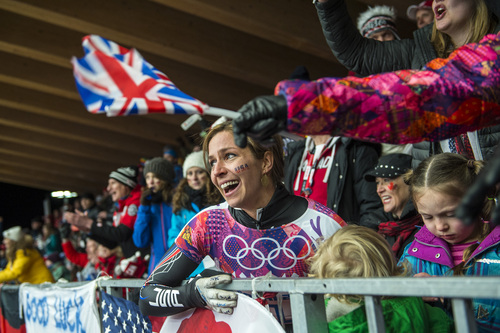This is an archived article that was published on sltrib.com in 2014, and information in the article may be outdated. It is provided only for personal research purposes and may not be reprinted.
Sochi, Russia
The reporter wanted to get the story right, so he earnestly asked the quarterback one more time: "Was it dead mother, blind father or blind mother, dead father?"
That's an old tale from a Super Bowl Media Day, but it plays into a theme of the 2014 Olympics. Tribune reporter Nate Carlisle astutely observed something that I'd missed in the midst of it all here in Russia. He discovered "a disproportionately high number of mentions about death" in stories about the Games.
This kind of "emotional voyeurism," as cited by the Los Angeles Times, reached a new level Sunday when NBC Sports reporter Christin Cooper was criticized widely for badgering skier Bode Miller about the impact of his brother's death in April. Miller eventually broke down and turned away, unable to continue the interview.
Miller responded via Twitter for viewers to "please be gentle" with Cooper, citing a moment that was "crazy emotional and not all her fault."
This theme generally is well-intended. Television coverage that turns sporting events into their own version of the "Today" show just partly is responsible for the trend. It stems from an effort to go beyond the details of the performance, to humanize the athletes and tell their stories, so I'll defend myself and other media members to some degree.
It's true that those of us who parachute into this huge spectacle and try to find stories too often grab onto the easy, readily available news hook, which explains the apparent preoccupation with the death of an athlete's relative. It can be overdone, creating almost a caricature of an athlete fulfilling a legacy. So when is it too much or too trite?
That's a dilemma. In the Miller episode, Cooper clearly went too far and probed too much. Yet the athlete often is the one setting this agenda.
For instance, freeskier Joss Christensen of Park City won a gold medal while carrying a photo of his father, JD, who died in August. Afterward, Christensen said, "I hope I made my father proud. ... I did it for him."
So how could that not be part of the story?
Similarly, reports about Noelle Pikus-Pace of Eagle Mountain — including ours — have mentioned her miscarriage in 2012. When she and her husband cite that experience as the main influence for her coming out of retirement, it has to be included in the discussion of her silver medal in skeleton, right?
It gets tricky sometimes, though. The truth is that this issue influenced my coverage of Salt Lake City native Faye Gulini on Sunday. By retelling part of her story, I knew I would have been added to the list of athletes' family tragedies, their relatives and the media outlets that connected them.
I ultimately decided that Gulini's losing her mother in an auto accident that she survived as a 5-year-old was more relevant to her story in 2010. That's when she made her Olympic debut at 17 in the snowboardcross event and climbed into the stands afterward to embrace the father who raised her, creating a memorable scene that included three of her siblings.
She's 21 now, immersed in her snowboarding career and Westminster College education, and there was enough material in her fourth-place showing Sunday for me to skip from her performing in the opening ceremony in 2002 to barely missing an Olympic medal. If she had medaled and a longer, deeper story was merited, would have I mentioned her mother? Absolutely.
And I would have made the list, without shame.
Twitter: @tribkurt



